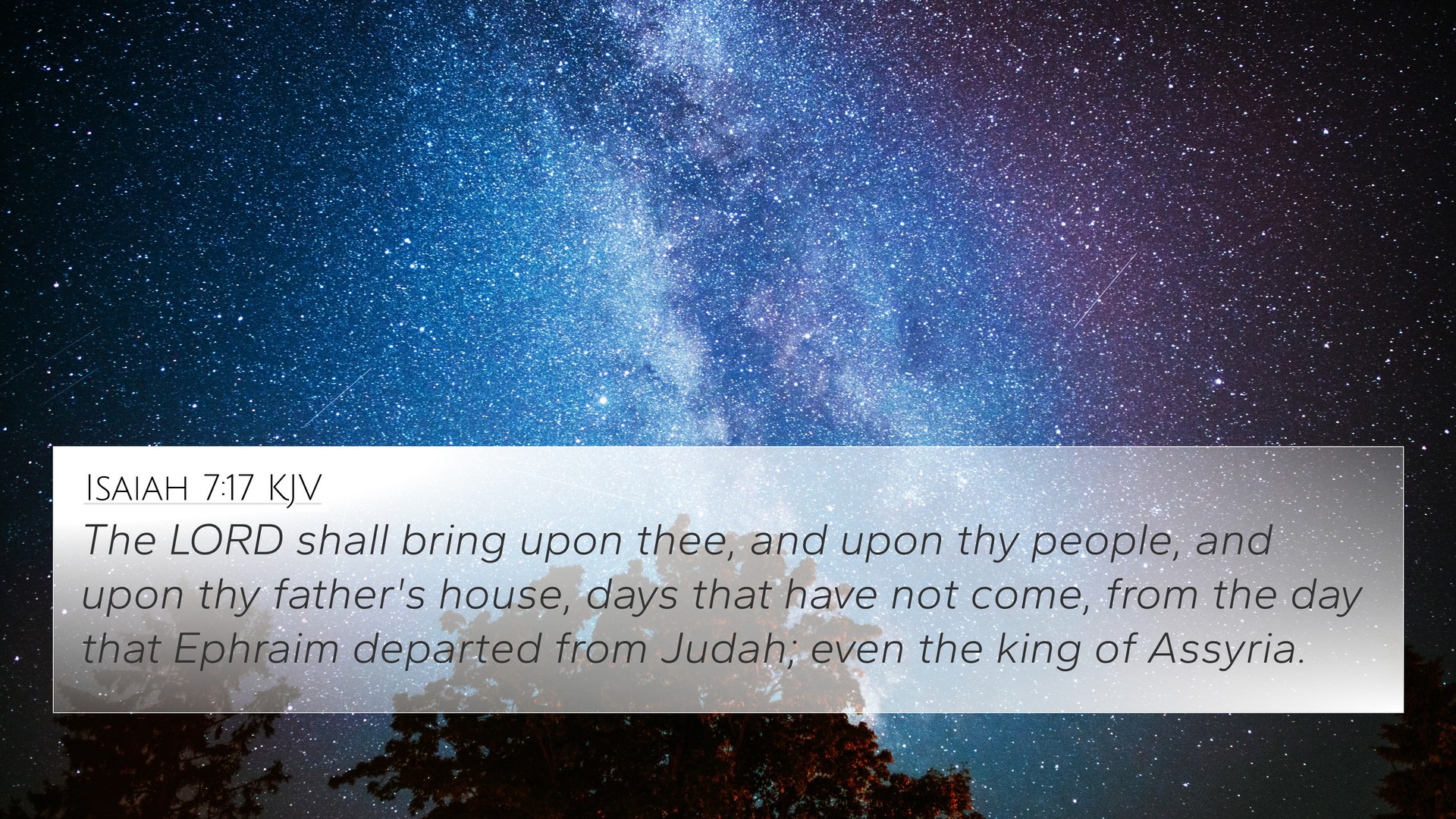Understanding Isaiah 7:17
Isaiah 7:17 states: "The Lord will bring upon you and upon your people and upon your father's house such days as have not come since the day that Ephraim departed from Judah—the king of Assyria." This verse is a prophetic warning to King Ahaz of Judah about the impending judgment that will come upon his reign due to his lack of faith and reliance on foreign powers instead of God.
Meaning and Interpretation
The significance of this verse can be understood through insights drawn from public domain commentaries. Below, we summarize key elements from Matthew Henry, Albert Barnes, and Adam Clarke.
-
Matthew Henry:
Henry emphasizes the seriousness of God’s judgment, which will be unlike anything previously experienced. He stresses that the departure of Ephraim (Israel) from Judah carries severe implications for the southern kingdom, with Assyria being a method of divine discipline rather than a remedy for Ahaz's situation.
-
Albert Barnes:
Barnes provides a historical context, detailing how the alliance with Assyria would backfire. He proposes that the days spoken of would be marked by significant strife and suffering, stressing the futility of depending on an earthly king for protection against real enemies.
-
Adam Clarke:
Clarke points out that the prophecy serves as a reminder of the consequences of disobedience and a call to acknowledge God's sovereignty. He highlights that the phrase about the days that have not occurred since Ephraim departed is a stark warning about the unique hardships that were about to befall Judah.
Cross-References and Connections
To grasp the full biblical context of Isaiah 7:17, one can find numerous cross-references that connect this verse to other scriptures. Here are some relevant connections:
- 2 Kings 16:7-9: Ahaz appeals to Tiglath-Pileser for assistance, reflecting reliance on foreign powers.
- Isaiah 1:7: Jerusalem is warned about desolation and destruction due to their iniquities.
- Isaiah 10:5: Assyria as the rod of God's anger, highlighting how God sometimes uses enemy nations for judgment.
- 2 Chronicles 28:20-21: The negative consequences of Ahaz's alliances are elaborated here.
- Isaiah 8:7-8: The coming judgment portrayed through the figure of the overflowing river of Assyria.
- Jeremiah 15:4: Similar themes of disaster due to disobedience resonate in Jeremiah’s prophecies.
- Micah 5:5: The context of Israel and Judah's prophetic warnings about leadership and judgment.
Conclusion
Isaiah 7:17 serves as a profound reminder of God’s overarching sovereignty and the necessity for His people to remain faithful. The intertwining of this scripture with others creates a robust framework for understanding the weight of divine prophecy and judgment.
This verse demonstrates the importance of maintaining a faithful relationship with God and the dangers associated with relying on human wisdom and alliances. In studying these connections, one can appreciate the thematic Bible verse connections that run throughout Scripture, revealing God's consistent message of justice, mercy, and faithfulness.
Tools for Further Study
- Using a Bible concordance to find cross-references efficiently.
- Exploring a Bible cross-reference guide for related themes.
- Engaging in cross-reference Bible study for deeper understanding.
- Utilizing a Bible cross-reference system for systematic study.













